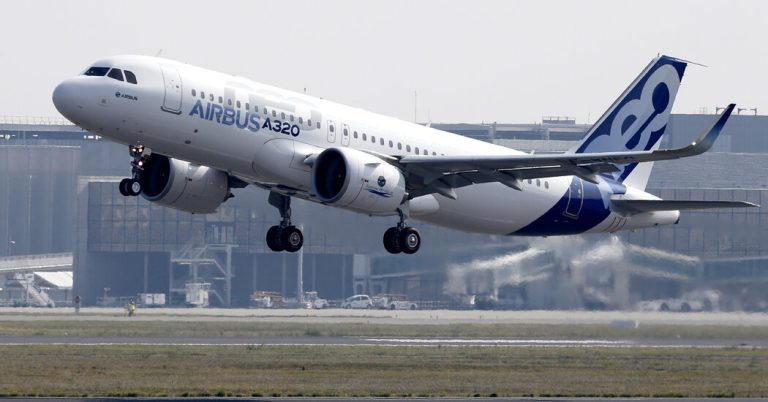Airbus said on Thursday it would increase deliveries of some of the world’s most sought-after planes this year, strengthening its position as the biggest plane maker and pulling ahead of Boeing as its US rival focuses on the fallout from a major security crisis that includes The 737 Max series of aircraft.
Airbus, the European aerospace giant, plans to deliver around 800 jets to customers this year, including the popular single-aisle A320neo, the main competitor to the 737 Max. It delivered 735 planes last year, more than it had originally targeted. This year’s push is meant to respond to what Guillaume Faury, the planemaker’s chief executive, said was a sharp recovery in demand for air travel after the pandemic lockdowns.
Airbus placed record orders for 2,094 commercial jets last year, driven in part by rising demand for narrow-body and mid-size aircraft from India and other fast-growing countries. This added to the company’s extensive backlog of 8,598 commercial aircraft at the end of 2023.
In contrast, Boeing delivered 528 commercial airplanes and recorded 1,576 net orders.
Airbus has also started work on preparing a successor to the best-selling A320neo, Mr Faury announced. The new plane will be more fuel efficient and would take to the skies in the mid to late 2030s.
The development of this plane, known as the Next Generation Single Aisle, would put Airbus ahead of Boeing in terms of state-of-the-art aircraft. The plane is intended to burn about 20 percent less fuel per seat and be made entirely of sustainable or synthetic materials. Analysts said Boeing may not have the war chest to move forward with new plane development as it prioritizes addressing the quality control crisis.
Airbus reported adjusted earnings of 5.8 billion euros ($6.2 billion) in 2023, a slight increase from the previous year, on revenue of more than 65 billion euros. The company added a special dividend, on top of its usual payout, as its net cash topped €10 billion.
The company’s profit was weighed down by a large decline in its space business, which Mr Faury said Airbus was working to reverse.
But in the core commercial jet business, where Airbus and Boeing make up the bulk of the world’s aircraft, the European manufacturer is extending its lead.
To the extent that Airbus has problems, it is meeting the challenge of producing the thousands of jets its customers have ordered at a faster scale. Mr Faury said he had seen significant interest from airlines around the world. But supply chain issues have made it harder to keep up with demand, a dilemma for the company as Boeing’s mistakes opened up new opportunities.
To that end, Mr. Faury said, Airbus is sticking to plans to increase production of the A320neo to 75 jets a month in 2026, though probably no more than that for several years after that.
Boeing had planned to increase production of the 737 model to about 50 planes a month by 2025. However, the US company suspended its forecast last month as it grapples with quality control issues highlighted by an incident in early January during which a door panel blew off The Alaska Airlines 737 Max 9 plane shortly after takeoff.
The episode rocked arch-rival Airbus, sparking a US federal investigation and forcing Boeing CEO Dave Calhoun to focus on reassuring customers, regulators and the public that the company is prioritizing safety over profits .
The crisis has slowed Boeing’s ability to produce more of its 737 Max jets. The Federal Aviation Administration announced it would limit Boeing’s ability to ramp up production of all 737 Max planes until the company proves it has resolved quality control issues.
Airbus’ headquarters complex just outside Toulouse in southwestern France is a testament to how quickly the company continues to grow. Airbus opened a new assembly line in Toulouse last summer to support development of the A321neo. And it recently cut the ribbon on a sleek new customer reception center to prepare for a rush of deliveries in the coming years.
On Wednesday, as Mr. Faury and Airbus executives were putting the finishing touches on the company’s earnings call, two recently completed Air India A320neos, their tails emblazoned with the carrier’s yellow logo, were parked at the new delivery center. Other planes, bound for IndiGo and British Airways, were also ready for delivery.
“We are offering more and we will continue to offer more,” said Jill Lawrie, head of Airbus’ customer experience group, speaking on the panoramic terrace of the new building, where a cavernous hangar used to house the mammoth A380 superjumbo. it had been converted to make the A321neo. “We are growing and we need to be more efficient and create more capacity to deliver our planes.”
At a news conference Thursday, Mr. Faury stressed the need to prioritize quality and safety over quantity even as the company works to ramp up production.
“It can’t be quantity over quality,” Mr. Faury said. “We don’t want to deliver a lot of planes. We want to deliver a number of planes that are high quality and safe.”
Mr. Faury emphasized that the company had a strong risk management culture that included extensive training programs for employees and people who came “not just to learn facts and figures,” but also about safety.
Analysts have pointed out that pandemic-era policies support this culture.
When the pandemic caused a deep recession in the aerospace industry, Airbus kept most of its employees on partially paid leave, mirroring a policy implemented across Europe to avoid rising unemployment and help companies retain experienced, long-term employees instead of to lose them. . Instead, Boeing laid off employees and worked to rehire once business conditions improved.
To maintain quality and safety controls, “the way to do it is to constantly challenge yourself,” Mr. Faury said, “to be afraid of what could happen and always think about what could go wrong.”




